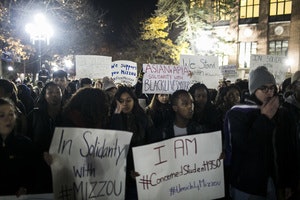 Student protesters at Michigan public universities are demanding that 10 percent of faculty members be African-American.
Student protesters at Michigan public universities are demanding that 10 percent of faculty members be African-American.If America is the land of opportunity, then earning a college degree is the key to really tapping the potential of that opportunity. In the last century, going to college has transitioned from something reserved for the elite to something that everyday citizens can aspire to do (with enough financial aid). There’s certainly a case to be made for the need for more diversity on college campuses, but overall our nation’s university system is improving the variety of students on campus and making the experience attainable to all class levels. It’s not perfect; but there’s a push to improve.
One area where colleges and universities consistently fall short, however, is in the number of minority faculty they employ. There are not enough professors of color. There are not enough women. There are not enough who represent the LBGTQ+ community. If we truly want our student body to be diverse and feed into a diverse workplace, we need to start where those students are earning their educations.
Not an accurate representation
Compared to the general U.S. population, diversity in college faculty is much lower. This isn’t to say that all the professors are White and of European descent, though that number is high. A recent report from Mother Jones found that, “At some schools, like Harvard, Stanford, the University of Michigan, and Princeton, there are more foreign teachers than Hispanic and black teachers combined.”
So we are hiring diverse faculty members on a global stage, but not a national one. There are an estimated 41.7 million Black Americans, and an estimated 54 million Hispanic ones, according to the 2010 U.S. Census numbers. That comes out to about 13.2 percent and 17 percent of the total U.S. population, respectively. To put this in perspective, there are student protests going on at Michigan public universities, demanding that 10 percent of faculty members be African-American. When you take urban areas like Detroit (where 84.3 percent of the population is Black) into account, asking for 10 percent is a drop in the bucket ― yet students are rallying to get the support to make it happen.
Can we change?
So the real question in all of this is not so much “is this happening?” but “what can we do to change this?” The first part is awareness, which it seems we are achieving.
The second part is for schools to take on the responsibility and step up to change it. That isn’t happening on as wide a scale as it should, but there are glimmers of hope that adding more minority faculty members is on the horizon for a good number of schools. A few good examples include:
- Brown University, which has announced that it is dedicating $100 million to look into diversity and race issues on its campus in the next decade. The faculty at the Providence campus is overwhelmingly White and male.
- Lewis & Clark College in Oregon held a diversity forum December 7 after a Rwandan student reported being assaulted because of his skin color. The school’s president, Barry Glassner, has also said an action plan is being put in place to improve diversity in faculty and students, as well as race relations at the school.
- The University of Connecticut plans to hire a chief diversity officer who will works toward improving diversity of the student population and of faculty and staff. UConn’s president, Susan Herbst, has said publicly that she was disappointed in the lack of diverse faculty members when she first arrived on campus four years ago and that UConn is severely lacking in an area where it really should stand out. The trend of hiring chief diversity officers is a positive one, as long as these executives are really empowered to make changes.
In the end, more minorities on college faculty only serves the benefit of everyone. It gives minority students realistic role models and gives non-minority students the chance to work with professors who may not look like them. Even the colleges themselves benefit from the added life experiences these minority faculty members bring to the table. In order to tap into the potential of a truly diverse, truly experience-rich college experience, we need to pay just as much attention to the diversity of our faculty as we do to our students.
Dr. Matthew Lynch is dean of the School of Education, Psychology, and Interdisciplinary Studies and an associate professor of education at Virginia Union University.


















